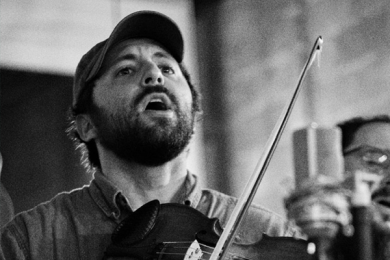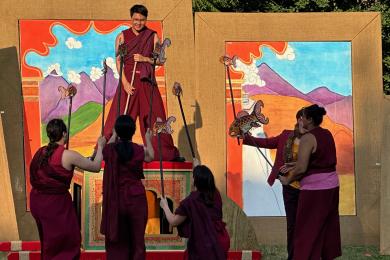Talking About Equity in the Arts
News
Talking About It Some More
Recently, I received this email:
"This e-mail is to invite you to a gathering of arts & culture organizations to discuss issues of racial equity in our arts environment. Conversations and actions around equity, representation and access have been at the forefront recently in both the local arts world and the broader community. Many individual artists and administrators have been working around these issues and actions, but the question of what can be done as organizations, and what a collective action or coalition might look like, is a question worth exploring.
Representatives from Mu Performing Arts, the Native American Community Development Institute, Pillsbury House + Theater, the Don't Buy Miss Saigon Coalition and Springboard for the Arts initially began talking about this in January, and we want to have this conversation as broadly, with as many of our colleagues and collaborators, as possible."
I'm not sure why I was invited to this discussion. Maybe it was my sparkling personality. Maybe it's because of all the times that I wrote about the protests against Miss Saigon at the Ordway. Or maybe it's the exploration of Hollywood's careless attitudes toward Asian actors I wrote under the thin guise of a biography of action movie actor Al Leong (It's probably that last one)
As often as we express our discomfort with talking about race and injustice, Americans are actually quite fond of talking about race, so much so that visitors from other nations are often dumbfounded at our ability to come up with new things to say about it. Not too long ago, I asked a friend of mine who is a recent immigrant from Europe if it really was weird how much we talk about it. "Yes, it's very weird," he said.
At any rate, I had a chance to sit down at the table with a lot of people who wanted to talk about race in the arts. More specifically, this conversation was about the idea of equity (the actual concept, not Actor's Equity) and the fact that large institutions consistently under-represent or misrepresent minority communities, even after they've been repeatedly called out for it. After the past few months we've had, what with the Miss Saigon protests, the controversy over the Walker's showing of Twelve Years a Slave, and the saga of Shannon Gibney, structural racism and MCTC, it seems that we're itching for another round of talk on the issue.
Community organizers and elected officials talk about racial and economic justice. Artists talk about whether large organizations like the Walker and the Guthrie can truly represent them anyway.
I was hoping to have some news article I could link to about the specific talk that I attended, but, alas, I have not found any. Also, I did not take good notes on the meeting, as I failed to realize that I may have been called there for my journalistic merits (which was a horrible mistake on the part of the organizers). There are plans to have a follow-up meeting, though, with the thoughts of moving past talk and creating action items for arts organizations. If so, I will cover it more thoroughly (if they invite me back). In the meantime, if you would like to start your own conversation and participate in this most American of pastimes, Springboard for the Arts is now offering their Creative Exchange for your use.
Or, you can enjoy Felicia Day's thoughts on race and casting in movies. (Because this is the internet, I am required to mention Felicia Day at least once per season.)
Can You Put a Price on Theatre?
A few years ago, I was attending a conference held by the Network of Ensemble Theaters (NET). Halfway through my second drink at an evening "meeting", I got to talking with another attendee about his theater company's crazy scheme of changing the price of their tickets the closer they got to performance time. As I finished that drink, he explained that instead of charging a flat $20 a head, they started off around $10 and rose to as much as $45 on the actual night. When I started my third drink, and he said that this insanity had actually resulted in more tickets sold and more income, I thought he must be drunk. Well into my fourth drink, I realized that, in fact, [SPOILER ALERT] it was me who was drunk the whole time!
After sobering up and doing my research, I figured out that this weird system is called "dynamic pricing", and it's the main reason no one can tell you exactly what an airline ticket will cost. As annoying as this seems to us in the general public, it has actually resulted in more people finding more tickets for prices they are willing to pay. Because of this, even NFL teams are starting to get in on the dynamic pricing action.
In the past few years, more theater companies have started to consider dynamic pricing as an option, though it has not been terribly popular. After all, it creates a vastly more complicated ticketing system that requires a well-oiled infrastructure to pull it off. And who's got that going for them?
Oh yeah… The Mouse. You've probably heard about the Lion King on Broadway breaking the billion dollar mark, but did you know how it got there? It's not just because of Julie Taymor. You can thank the programmers who wrote the algorithms controlling the ticket prices for the show.
What Makes Quality?
Do robust ticket sales signify quality? Does equitable representation? Does fat stacks of donated cash? Does favorable criticism?
Or how about succeeding in spite of what critics said about you? Or succeeding in spite of the arbitrary restrictions on funding?
Or maybe you're just born that way. Or maybe it's just because you're lucky enough know Judi Dench.
Or maybe, just maybe, quality can be measured in how far you will go to make your dreams come true. On that note, I leave you this week with the story of how a group reclaimed an abandoned house as a rehearsal space.




